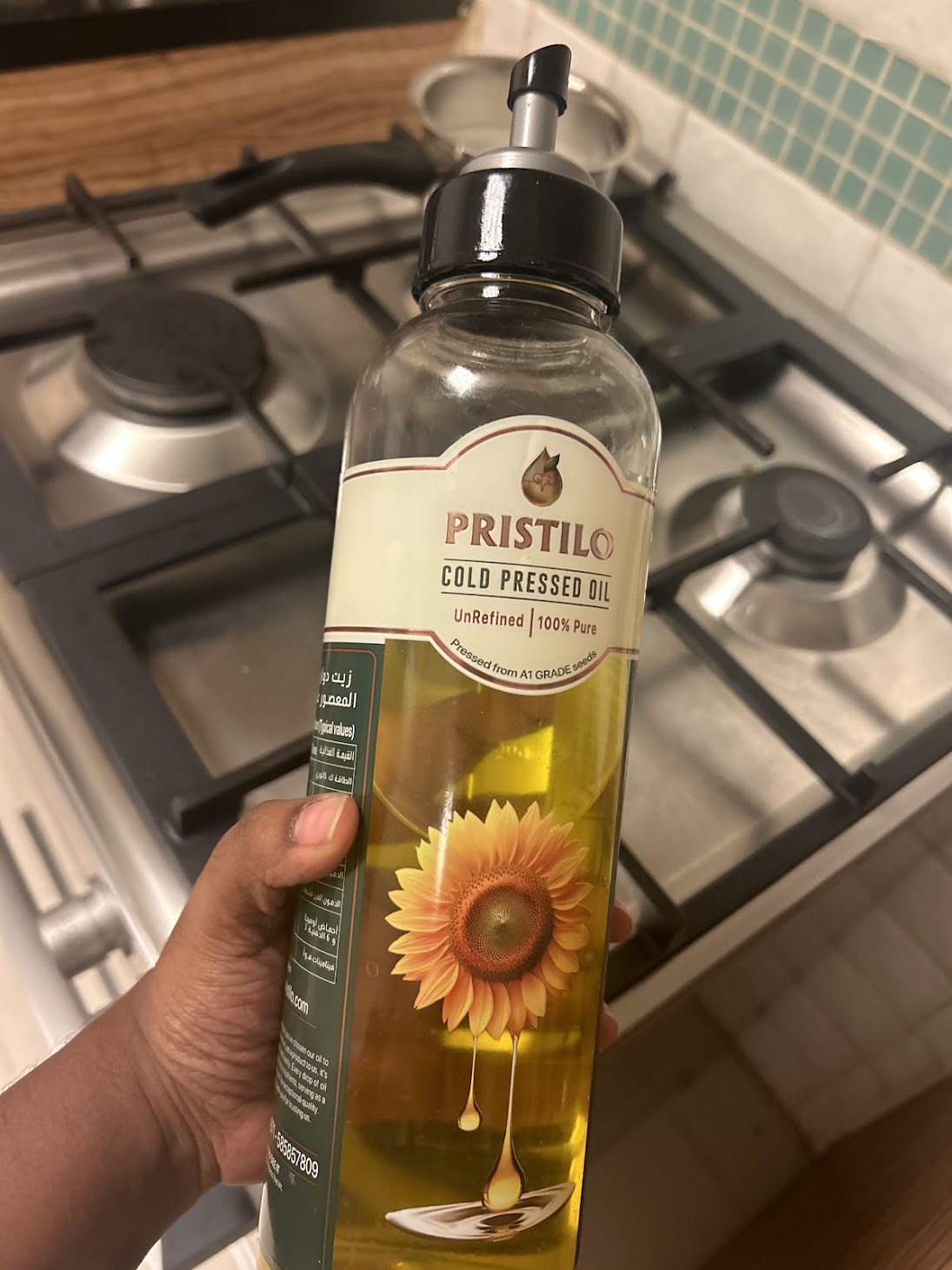Cold Pressed Flax Seed Oil
Cold Pressed Flax Seed Oil
Cold pressed Flax seed oil is rich in alpha-linolenic acid (ALA), an essential omega-3 fatty acid, along with lignans, polyphenols, and vitamin E. Flax seed oil is the highest source of Omega 3 for Vegetarians and is highly valued for its role in nutritional support.
In Ayurveda, flax seeds are known as Alasi or Atasi and are mentioned in classical texts for their balancing, nourishing, and healing properties. Traditionally, they are used to support digestion, skin health and reproductive wellness.
Flax Seed Oil in the Budwig Diet
The Budwig Diet, developed by German biochemist Dr. Johanna Budwig, emphasizes a blend of cold-pressed flax seed oil and cottage cheese (quark).
This combination enhances cellular oxygenation and provides a rich source of omega-3 fatty acids and sulfur-based proteins.
• Widely promoted as part of a complementary cancer management approach, it aims to reduce tumor growth and improve overall vitality.
• While some studies highlight flaxseed’s lignans and omega-3s for their anti-cancer potential, it should be noted that the Budwig Diet remains a complementary approach and not a substitute for medical treatment.
[Mandal, S. et al. (2014). Flaxseed in disease prevention and health promotion. Nutrition & Cancer, 66(3), 410–421.]
[Schmidt, H. (2005). The Budwig Diet: Flaxseed oil and cottage cheese. Townsend Letter, 262, 86–90.]
Disclaimer: This information is for educational purposes only and not intended as medical advice. Flax seed oil and the Budwig Diet may support wellness, but they should not replace professional cancer treatment. Always consult a healthcare provider before starting any diet or supplementation.
Cold Pressed Flax Seed Oil
Cold pressed Flax seed oil is rich in alpha-linolenic acid (ALA), an essential omega-3 fatty acid, along with lignans, polyphenols, and vitamin E. Flax seed oil is the highest source of Omega 3 for Vegetarians and is highly valued for its role in nutritional support.
In Ayurveda, flax seeds are known as Alasi or Atasi and are mentioned in classical texts for their balancing, nourishing, and healing properties. Traditionally, they are used to support digestion, skin health and reproductive wellness.
Flax Seed Oil in the Budwig Diet
The Budwig Diet, developed by German biochemist Dr. Johanna Budwig, emphasizes a blend of cold-pressed flax seed oil and cottage cheese (quark).
This combination enhances cellular oxygenation and provides a rich source of omega-3 fatty acids and sulfur-based proteins.
• Widely promoted as part of a complementary cancer management approach, it aims to reduce tumor growth and improve overall vitality.
• While some studies highlight flaxseed’s lignans and omega-3s for their anti-cancer potential, it should be noted that the Budwig Diet remains a complementary approach and not a substitute for medical treatment.
[Mandal, S. et al. (2014). Flaxseed in disease prevention and health promotion. Nutrition & Cancer, 66(3), 410–421.]
[Schmidt, H. (2005). The Budwig Diet: Flaxseed oil and cottage cheese. Townsend Letter, 262, 86–90.]
Disclaimer: This information is for educational purposes only and not intended as medical advice. Flax seed oil and the Budwig Diet may support wellness, but they should not replace professional cancer treatment. Always consult a healthcare provider before starting any diet or supplementation.
1. Cardiovascular Health – Rich in omega-3 ALA, flax seed oil supports healthy cholesterol levels and reduces the risk of atherosclerosis.
[Bloedon, L.T. & Szapary, P.O. (2004). Flaxseed and cardiovascular risk. Nutrition Reviews, 62(1), 18–27.]
2. Anti-Inflammatory Effects – Omega-3 fatty acids reduce systemic inflammation and support joint health.
[Hall, C. et al. (2005). Flaxseed as a functional food source. Journal of the Science of Food and Agriculture, 85(12), 1989–2000.]
3. Hormonal Balance – Lignans in flaxseed may support estrogen balance, beneficial in women’s health.
[Adlercreutz, H. (2007). Lignans and human health. Critical Reviews in Clinical Laboratory Sciences, 44(5–6), 483–525.]
1. Cardiovascular Health – Rich in omega-3 ALA, flax seed oil supports healthy cholesterol levels and reduces the risk of atherosclerosis.
[Bloedon, L.T. & Szapary, P.O. (2004). Flaxseed and cardiovascular risk. Nutrition Reviews, 62(1), 18–27.]
2. Anti-Inflammatory Effects – Omega-3 fatty acids reduce systemic inflammation and support joint health.
[Hall, C. et al. (2005). Flaxseed as a functional food source. Journal of the Science of Food and Agriculture, 85(12), 1989–2000.]
3. Hormonal Balance – Lignans in flaxseed may support estrogen balance, beneficial in women’s health.
[Adlercreutz, H. (2007). Lignans and human health. Critical Reviews in Clinical Laboratory Sciences, 44(5–6), 483–525.]
1. Oral Supplementation: Consumed daily to support heart health, metabolism, and inflammation control.
2. Dermatological Use: Applied to skin to reduce dryness, irritation, and improve elasticity.
1. Oral Supplementation: Consumed daily to support heart health, metabolism, and inflammation control.
2. Dermatological Use: Applied to skin to reduce dryness, irritation, and improve elasticity.
Cold Pressed Flax Seed Oil
Cold pressed Flax seed oil is rich in alpha-linolenic acid (ALA), an essential omega-3 fatty acid, along with lignans, polyphenols, and vitamin E. Flax seed oil is the highest source of Omega 3 for Vegetarians and is highly valued for its role in nutritional support.
In Ayurveda, flax seeds are known as Alasi or Atasi and are mentioned in classical texts for their balancing, nourishing, and healing properties. Traditionally, they are used to support digestion, skin health and reproductive wellness.
Flax Seed Oil in the Budwig Diet
The Budwig Diet, developed by German biochemist Dr. Johanna Budwig, emphasizes a blend of cold-pressed flax seed oil and cottage cheese (quark).
This combination enhances cellular oxygenation and provides a rich source of omega-3 fatty acids and sulfur-based proteins.
• Widely promoted as part of a complementary cancer management approach, it aims to reduce tumor growth and improve overall vitality.
• While some studies highlight flaxseed’s lignans and omega-3s for their anti-cancer potential, it should be noted that the Budwig Diet remains a complementary approach and not a substitute for medical treatment.
[Mandal, S. et al. (2014). Flaxseed in disease prevention and health promotion. Nutrition & Cancer, 66(3), 410–421.]
[Schmidt, H. (2005). The Budwig Diet: Flaxseed oil and cottage cheese. Townsend Letter, 262, 86–90.]
Disclaimer: This information is for educational purposes only and not intended as medical advice. Flax seed oil and the Budwig Diet may support wellness, but they should not replace professional cancer treatment. Always consult a healthcare provider before starting any diet or supplementation.
Cold Pressed Flax Seed Oil
Cold pressed Flax seed oil is rich in alpha-linolenic acid (ALA), an essential omega-3 fatty acid, along with lignans, polyphenols, and vitamin E. Flax seed oil is the highest source of Omega 3 for Vegetarians and is highly valued for its role in nutritional support.
In Ayurveda, flax seeds are known as Alasi or Atasi and are mentioned in classical texts for their balancing, nourishing, and healing properties. Traditionally, they are used to support digestion, skin health and reproductive wellness.
Flax Seed Oil in the Budwig Diet
The Budwig Diet, developed by German biochemist Dr. Johanna Budwig, emphasizes a blend of cold-pressed flax seed oil and cottage cheese (quark).
This combination enhances cellular oxygenation and provides a rich source of omega-3 fatty acids and sulfur-based proteins.
• Widely promoted as part of a complementary cancer management approach, it aims to reduce tumor growth and improve overall vitality.
• While some studies highlight flaxseed’s lignans and omega-3s for their anti-cancer potential, it should be noted that the Budwig Diet remains a complementary approach and not a substitute for medical treatment.
[Mandal, S. et al. (2014). Flaxseed in disease prevention and health promotion. Nutrition & Cancer, 66(3), 410–421.]
[Schmidt, H. (2005). The Budwig Diet: Flaxseed oil and cottage cheese. Townsend Letter, 262, 86–90.]
Disclaimer: This information is for educational purposes only and not intended as medical advice. Flax seed oil and the Budwig Diet may support wellness, but they should not replace professional cancer treatment. Always consult a healthcare provider before starting any diet or supplementation.
1. Cardiovascular Health – Rich in omega-3 ALA, flax seed oil supports healthy cholesterol levels and reduces the risk of atherosclerosis.
[Bloedon, L.T. & Szapary, P.O. (2004). Flaxseed and cardiovascular risk. Nutrition Reviews, 62(1), 18–27.]
2. Anti-Inflammatory Effects – Omega-3 fatty acids reduce systemic inflammation and support joint health.
[Hall, C. et al. (2005). Flaxseed as a functional food source. Journal of the Science of Food and Agriculture, 85(12), 1989–2000.]
3. Hormonal Balance – Lignans in flaxseed may support estrogen balance, beneficial in women’s health.
[Adlercreutz, H. (2007). Lignans and human health. Critical Reviews in Clinical Laboratory Sciences, 44(5–6), 483–525.]
1. Cardiovascular Health – Rich in omega-3 ALA, flax seed oil supports healthy cholesterol levels and reduces the risk of atherosclerosis.
[Bloedon, L.T. & Szapary, P.O. (2004). Flaxseed and cardiovascular risk. Nutrition Reviews, 62(1), 18–27.]
2. Anti-Inflammatory Effects – Omega-3 fatty acids reduce systemic inflammation and support joint health.
[Hall, C. et al. (2005). Flaxseed as a functional food source. Journal of the Science of Food and Agriculture, 85(12), 1989–2000.]
3. Hormonal Balance – Lignans in flaxseed may support estrogen balance, beneficial in women’s health.
[Adlercreutz, H. (2007). Lignans and human health. Critical Reviews in Clinical Laboratory Sciences, 44(5–6), 483–525.]
1. Oral Supplementation: Consumed daily to support heart health, metabolism, and inflammation control.
2. Dermatological Use: Applied to skin to reduce dryness, irritation, and improve elasticity.
1. Oral Supplementation: Consumed daily to support heart health, metabolism, and inflammation control.
2. Dermatological Use: Applied to skin to reduce dryness, irritation, and improve elasticity.
Testimonials

Thanks Anoop for personally delivering the product. Being a mom, I loved the whole idea of inception of Pristilo. The transparency of the process and knowledge and information on the page impressed me. The product, packaging and delivery all were top notch. We deep fried some snacks and we could definitely taste the difference and felt the lightness of the oil. Can’t wait to try the other oils from Pristilo.

Enjoyed visting this place. Liked the idea of seeing is believing and they truly delivered to what was promised. Great job Pristilo and great product..

Perfect place for getting 100% pure oil, i asked them to make the oil infront of me and they were more than happy to even give us a tour of their process. Love the product and service. Highly recommended if you want to make your daily meals healthier.



